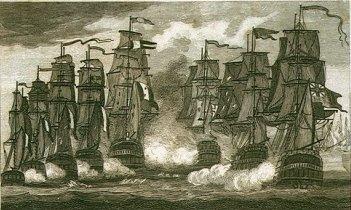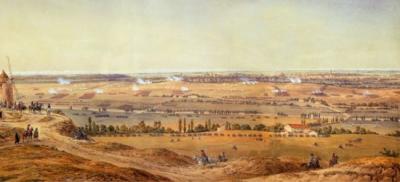
Nat Gould
His life and books
John Gould 1784-1814
| John Gould |
|---|
| Born: 1784 Pilsbury Grange, Derbyshire |
| Died: 1814 Toulouse, France |
| Father |
| Richard Gould 1741-1820 |
| Mother |
| Mary Goodwin 1754-1815 |
| Siblings |
| Richard Gould 1780-1843 |
| Edmund Gould 1782-1833 |
| William Gould 1793-1794 |
John Gould was the son of Richard Gould 1741-1820 of Pilsbury Grange and his wife Mary. He was born at Pilsbury Grange in 1784, and baptised at Hartington on 19 December 1784.
When he had reached the age of 22 years he was already serving in the Navy.
In November 1806 John Gould was on board the East India Company’s ship Dorsetshire, which had docked (or was shortly expected) at Gravesend in Kent.

Battle of Pulo Aura 1804
His ship had a very distinguished history.
In February 1804, as part of a fleet of East India Company merchant ships she sailed home from China. Their valuable cargo was worth over £500 million in present-day money.
The lightly armed fleet encountered French warships stationed at the entrance to the Malacca Straits.
In the resulting Battle of Pulo Aura the French were totally defeated.
The British fleet was commanded by Sir Nathaniel Dance, a now almost forgotten hero.
John Gould sailed on board the Dorsetshire in the Spring of 1805, probably on a voyage to India or China.

Battle of Toulouse 1814
A letter (1) that his father Richard Gould 1741-1820 wrote to him from Pilsbury Grange when the ship was due at Gravesend has survived, and is dated 4 November 1806 (2).
As for the later career of John Gould, he continued his service in the armed forces, but sadly lived for only another eight years. He died on 10 April 1814 at the Battle of Toulouse in southern France, which the allied forces were besieging during the Peninsula War.
Although Napoleon Bonaparte had already surrendered, and the war was over, that news had not then reached Wellington at Toulouse. And so John Gould, with hundreds of others, died tragically and unnecessarily in storming the city.
"My regiment now had not been seriously engaged with the enemy, for some time, and as the campaign appeared to have come to a close, — for the Dutch at this time had risen to shake off their yoke — and it was supposed that the French would have been obliged to quit the lower Pyrenees, I therefore took the opportunity of obtaining leave of absence in the month of February (1814) and proceeded to England on urgent private affairs. However, it so happened that the campaign was unexpectedly resumed, and two actions were afterwards fought, — the battle of Orthes, 27th April [should be February], and the battle of Toulouse, 10th April, (1814). The XX, at the battle of Orthes, was commanded by Major Bent, who, poor fellow, unfortunately fell that day, as also did Captain St. Aurin ; several officers were wounded and many men killed and wounded in this action : at the battle of Toulouse the regiment had a few men killed and wounded.
Major Bent had been wounded 25th July, 1813,and also at the landing in Egypt, 8th March, 1801, when in the 92nd Regiment ; he was a very good officer, and had been many years in the XX ; I much regretted his loss, as we were great friends.
The battle of Toulouse ought never to have been fought, as the French commander well knew that peace had been made, but never apprized Lord Wellington of it. It was therefore a useless sacrifice of men on that day, entirely owing to the conduct of the French General." (3).
(1) Letter 1 of the Letters from Pilsbury Grange.
(2) The writer Richard Gould was the grandfather of Richard Goodwin Gould 1822-1892, who preserved the letter.
(3) Reminiscences of My Military Life from 1795 to 1818, by the late Lieut.-Col. Chas. Steevens, formerly of the XX Regiment; edited by his son, Lieut.-Col. Nathaniel Steevens, late of the XX and 88th Regiments (1878) pages 119-120.
